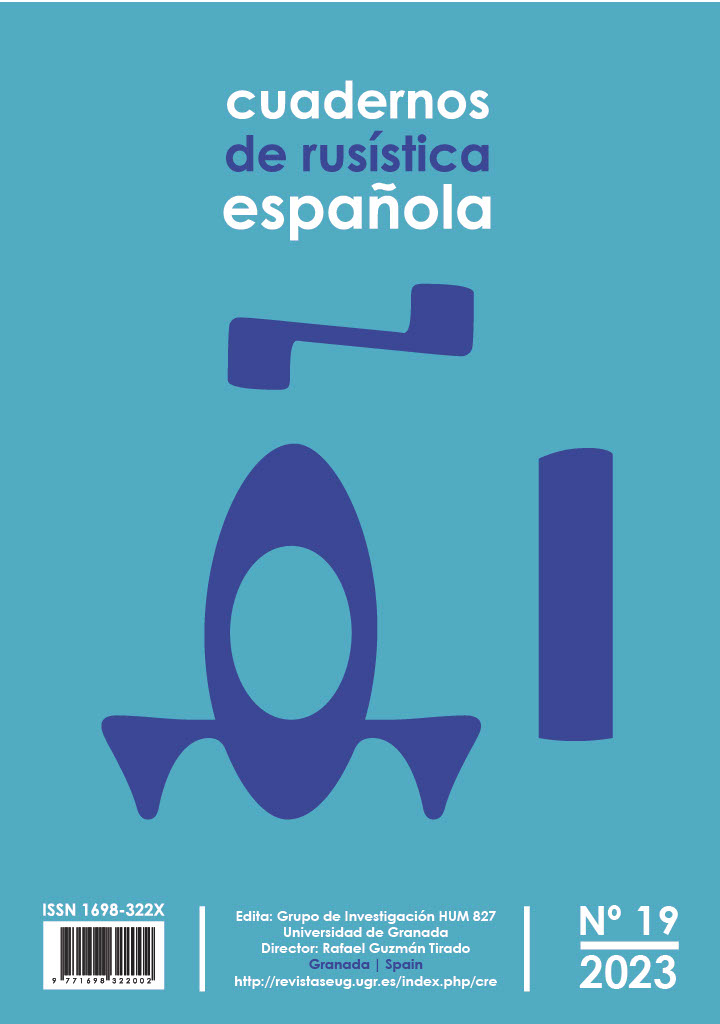Methodology for the Development of Intellectual Activity of Future Philologists in the Digital Environment
DOI:
https://doi.org/10.30827/cre.v19.29077Keywords:
intellectual activity, conceptual content, mental model, methodological model, electronic course, educational processAbstract
The article deals with the problem of developing the intellectual activity of future philologists in the learning process. In the modern education system, there is an increased interest in the digital competence of university graduates, the use of traditional methods and technologies has exhausted its possibilities, especially in conditions of mixed learning. In this regard, it became necessary to revise the usual teaching methods and find more effective ones, using all the technical capabilities of the digital environment to activate the intellectual activity of students. In this paper, a conceptual analysis of the mental essence of the concept of «intellectual activity» is carried out in the format of an intelligence map, on its basis, conceptual dominants are identified, which were used to model the methodological system for the development of intellectual activity in the process of vocational training. The results of the study of the content and mechanisms of internal and external intellectual activity of the subject of teaching are presented, the understanding of which will allow teachers to effectively organize the educational process. The significance of this work lies in the fact that, based on the generalization of conceptual information about the mental essence of the concept of «intellectual activity», a methodological model for the formation of professional competencies of future philologists through the activation of their intellectual activity in the process of studying an electronic course on the discipline «Vocabulary and lexicography in the aspect of synchrony and diachrony» has been developed and tested. The electronic course created according to the methodological model allowed to increase the educational motivation of students, provided productive collaboration of teachers and students on digital platforms through the integration of traditional and innovative teaching methods.
Downloads
References
ABAIDELDANOVA, M.K., LARINA, T.V. (2021): Intellektual'naya aktivnost' i tsifrovizatsiya – realii novogo formata vysshego lingvisticheskogo obrazovaniya. VESTNIK Yevraziyskogo natsional'nogo universiteta im. L.N. Gumileva. Seriya Filologiya, 2 (135), S. 110–119. DOI: 10.32523/2616-678Х-2021-135-2-110-119.
ASHILOVA, M.S., BEGALINOV, A.S., BEGALINOVA, K.K. (2019): O vliyanii tsifrovizatsii obshchestva na kazakhstanskoye obrazovaniye. Science for Education Today, Research Electronic Journal, 9(6), S. 40–51. DOI: https://doi.org/10.15293/2658-6762.1906.03
BOGOYAVLENSKAYA, D.В. (2019): Filosofskiye osnovy teorii odarennosti. Kul'turno-istoricheskaya psikhologiya, 15(2), S. 14–21.
BOGOYAVLENSKAYA, D.В., KOTLYAROVA, L.A. (2017): Methodological concepts of building up the creativity typology. SOCIETY. INTEGRATION. EDUCATION. Proceedings of the International Scientific Conference. Volume I, p. 469–476. DOI: https://doi.org/10.17770/sie2017vol1.2298
BÖRÜ, N. (2018): The factors affecting teacher-motivation. International Journal of Instruction, 11(4), p. 761–776. DOI: https://doi.org/10.12973/iji.2018.11448a
BUZAN, T. (2018): Mind Map Mastery: The Complete Guide to Learning and Using the Most Powerful Thinking Tool in the Universe // T. Buzan. London: Watkins Publishing.
BUZAN, T. (2002): How to Mind Mapping: The ultimate thinking tool that will change your life. London: Thorson: 6.
DE RIBAUPIERRE, A. LECERF, T. (2017): Intelligence and Cognitive Development: Three Sides of the Same Coin. J. Intell, 5 (2), p. 14. DOI: https://doi.org/10.3390/jintelligence5020014
ERDEM, A. (2017): Mind Maps as a Lifelong Learning Tool. Universal Journal of Educational Research, 5 (12A), p. 1–7. DOI: https://doi.org/10.13189/ujer.2017.051301
GIRVAN, C. (2016) Extending experiential learning in teacher professional development. Teaching and Teacher Education, 58, p. 129–139. DOI: https://doi.org/10.1016/j.tate.2016.04.009
KOSTROMINA, S. (2013): Academic Skills as a Basis for Self-organization of Human Activity. Procedia – Social and Behavioral Sciences, 86, p. 543–550. DOI: https://doi.org/10.1016/j.sbspro.2013.08.611
MISHINA, M.M. (2014): Spetsifika intellektual'noy deyatel'nosti lichnosti. Vestnik Moskovskogo gosudarstvennogo oblastnogo universiteta. Seriya: Psikhologicheskiye nauki, 1, S. 6–12.
MUSIYCHUK, M.V., PAVLOV, A.P. (2016): «Layfkhak» kak forma intellektual'noy aktivnosti v sovremennykh intellektual'nykh sistemakh. Internet zhurnal «Mir nauki», 4 (1), S. 1–11.
NETO, M. (2015): Educational motivation meets Maslow: Self-actualisation as contextual driver. Journal of Student Engagement: Education Matters, 5(1), p. 18–27.
OZHIGANOVA, G.V. (2018): Self-regulation and self-regulatory capacities: components, levels, models. RUDN Journal of Psychology and Pedagogics, 15 (3), p. 255–270. DOI: https://doi.org/10.22363/2313-1683-2018-15-3-255-270
PICHUGINA, G.A. (2020): Productive and reproductive teaching methods in the organization of modern education. Balkan Scientific Review, 4(10), p. 16–19. DOI: https://doi.org/10.34671/SCH.BSR.2020.0404.0004
POPOV, L., IBRAGIMOVA, E. (2015): Psychology of intellectual activity-related development of a student. Asian Social Science, 1, p. 279–287. DOI: https://doi.org/10.5539/ass.v11n1p279
RICARDO NACOR RÍOS-LOZADA et.al., (2022): Google Classroom in Educational Service: A systematic Review. Journal of Positive School Psychology, 6(2), p. 1634–1639.
ROMANOVA, L.L. (2023): Spetsifika professional'nogo obucheniya v usloviyakh razvitiya tsifrovizatsii i iskusstvennogo intellekta. Nauchno-metodicheskiy elektronnyy zhurnal «Kontsept», 07, S. 130–141.
STEINMAYR, R., WEIDINGER, A.F., SCHWINGER, M. SPINATH, B. (2019): The importance of students’ motivation for their academic achievement – Replicating and extending previous findings. Frontiers in Psychology, 10, Article number: 1730. DOI: https://doi.org/10.3389/fpsyg.2019.01730
SURYANINGTYAS, A., KIMIANTI, F., KUN PRASETYO, Z. (2019): Developing science electronic module based on problem-based learning and guided discovery learning to increase critical thinking and problem-solving skills. Advances in Social Science, Education and Humanities Research. International Conference on Educational Research and Innovation (ICERI 2019), p. 65–70. DOI: https://doi.org/10.2991/assehr.k.200204.013
TAYLOR, S.A., HUNTER, G.L., MELTON, H., GOODWIN, S.A. (2011): Student Engagement and Marketing Classes. Journal of Marketing Education, 33, p. 73–92. DOI: https://doi.org/10.1177/0273475310392542
TEE, T.K., AZMAN, M.N.A., MOHAMED, S. (2014): Buzan Mind Mapping: An Efficient Technique for Note-Taking. World Academy of Science, Engineering and Technology International Journal of Psychological and Behavioral Sciences, 8 (1), p. 28–31.
Tolkovyy slovar' russkogo yazyka pod redaktsiyey D.N. Ushakova. URL: https://ushakovdictionary.ru/. Data obrashcheniya: 30.06.2023.












